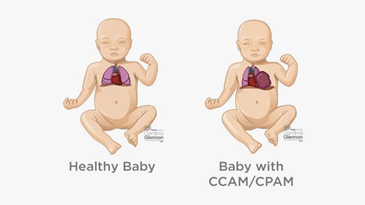Congenital pulmonary airway malformation (CPAM)
What is it?
Formerly known as CCAM (Congenital Cystic Adenomatoid Malformation).
We have five parts to our lungs known as lobes, two on the left and three on the right. A CPAM is an abnormality in one or more of the lobes in which the lobe contains a group of fluid or air-filled spaces (cysts) rather than lung tissue.
The lung tissue does not function properly but the CPAM can continue to grow.
Why does this happen?
The exact reason is unknown. You have not done or done anything to cause it.
How will this affect baby?
These cysts can vary in size and appearance and can change significantly during pregnancy.
In most cases, babies will do well and will be carried until full term without a problem.
Usually one or two things can happen:
- The mass may actually start to shrink or disappear. This is because the mass has stopped growing while baby’s chest continues to develop. The lungs develop normally despite the CPAM.
- It may continue to grow during your pregnancy
- If the mass grows, which will occur in a small number of cases, it can cause more serious problems for the baby.
Picture of CPAM

What happens next?
You will be able to discuss the scan findings with the Fetal Medicine Midwife or an appropriately trained professional.
A referral will be made to the Fetal Medicine Clinic where you will have a further scan and an opportunity to discuss in more detail with the Consultant Obstetrician.
Pregnancy
Regular scans will be performed in Fetal Medicine clinic to monitor the size of the mass, baby’s wellbeing, growth and amniotic fluid. (fluid can sometimes increase in pregnancy)
A referral may be made to the tertiary centre, Bristol Fetal Medicine Unit, St Michaels Hospital.
During this appointment you will have a further scan and consultation regarding the condition and outlook. Further tests or procedures may be offered at the tertiary centre if deemed necessary.
The Neonatologist (Doctor who cares for new-born babies) will be informed of the CPAM and if needed a discussion regarding baby’s care can be arranged.
Delivery
A vaginal delivery is desirable unless contraindicated. A delivery plan can be discussed with the Consultant Obstetrician later in the pregnancy.
Delivery can take place at your local hospital but if the CPAM is deemed large then delivery takes place at the closest Paediatric Surgical Unit which is the University Hospital Wales in Cardiff. (Referral will be made prior to delivery for an appointment in Cardiff Fetal Medicine Unit)
In a small number of babies, an operation may be necessary to remove the cysts.
Most babies have no problems at all.
The neonatal Doctor will carefully examine baby and make arrangements for further tests i.e. scan.
Some babies may experience respiratory difficulties and may require oxygen therapy.
What is the long-term outlook?
The long-term outlook for most babies is excellent and they will recover to lead a normal life.
Support
This is a stressful and difficult time so if you have any further questions or concerns please contact the Fetal Medicine Midwife on the numbers below.
Contact Numbers
Royal Gwent Hospital 01633 234747
Nevill Hall Hospital 01873 732390 or 01873 732391
Useful Websites
ARC (Antenatal Results and Choices) - Offer information and support to parents who are making decisions before, during and after tests in pregnancy
Tel no: 084507722990
Website: https://www.arc-uk.org/
Email: info@arc-uk-org
British Lung Foundation
Website: https://www.blf.org.uk/




